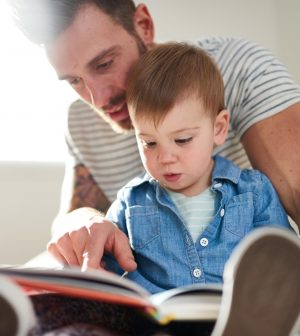- Could Artificial Sweeteners Be Aging the Brain Faster?
- Techniques for Soothing Your Nervous System
- Does the Water in Your House Smell Funny? Here’s Why
- Can a Daily Dose of Apple Cider Vinegar Actually Aid Weight Loss?
- 6 Health Beverages That Can Actually Spike Your Blood Sugar
- Treatment Options for Social Anxiety Disorder
- Understanding the Connection Between Anxiety and Depression
- How Daily Prunes Can Influence Cholesterol and Inflammation
- When to Take B12 for Better Absorption and Energy
- Epsom Salts: Health Benefits and Uses
Babies, Toddlers Produce Stronger Immune Response to COVID Than Adults

In a finding that could influence future COVID vaccine recommendations for the youngest Americans, new research finds that infants and toddlers have a stronger immune response to the new coronavirus than adults do.
To arrive at that conclusion, scientists analyzed blood samples collected from 682 unvaccinated children and adults up to age 62, in 175 Maryland households between November 2020 and March 2021.
Of those people, 56 had evidence of SARS-CoV-2 antibodies, indicating prior infection. They included 15 children ages 3 months to 4 years, 13 children ages 5 to 17, and 28 adults 18 and older.
Antibodies to a key spot on the virus’s outer spike protein were more than 13 times higher in children ages 4 and under and nearly nine times higher in children ages 5-17, when compared to adults.
The researchers also found that levels of SARS-CoV-2 neutralizing antibodies, which may help predict protection against severe COVID, were nearly twice as high in children ages 4 and younger than in adults.
In most households where both children and adults had antibody evidence of prior infection, children ages 4 and under had the highest levels of both types of antibodies of all infected members of the household, according to the study, published online March 22 in the journal JCI Insight.
“This study demonstrates that even children in the first few years of life have the capacity to develop strong antibody responses to SARS-CoV-2 infection, which in some cases exceed adult responses,” said lead investigator Dr. Ruth Karron, director of the Johns Hopkins Vaccine Initiative at the Johns Hopkins Bloomberg School of Public Health in Baltimore.
“These findings should provide some reassurance that with the appropriate vaccine doses we can effectively immunize very young children against SARS-CoV-2,” Karron added in a Hopkins news release.
Children ages 5 to 17 are now eligible for the Pfizer COVID vaccine, while studies of the vaccine in younger children are ongoing.
More information
For more on children and COVID-19, see the American Academy of Pediatrics.
SOURCE: Johns Hopkins Bloomberg School of Public Health, news release, March 22, 2022
Source: HealthDay
Copyright © 2026 HealthDay. All rights reserved.










